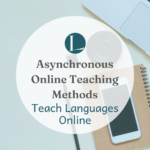August 4th, 2020
What’s a Fair Price to Pay Online Teachers?
In recent years, it’s become easier than ever to connect with a tutor for the language you’re learning online. And as tempting as it is to opt for “Tutors from $5!”, is it time we asked ourselves if we’re really happy paying such low fees for what we’re asking of people?

You can listen to a version of this post on the Teach Languages Online Podcast.
I get it. I’ll be the first to hold my hands up and admit that I’ve paid too little for the time and efforts of multiple online language tutors over the years.
It’s too tempting to get more lessons for your buck and convince yourself that besides, if they’re advertising themselves at that price, it’s fine…right?
But I’ve also been on the other side of this, as an online teacher, and the pressure to position yourself as cheaply as possible to be even remotely competitive to get students is very real. Even if that means charging lower than an hour of minimum wage in your country.
So in this post, I want to lay clear the reality of online tutoring, pricing, and why we should finally start paying all tutors what they’re worth.
What Is Someone Worth Anyway?
Those words are thrown around a lot though, aren’t they? What you’re worth.
“Charge what you’re worth.”
“Pay someone what they’re worth.”
How do you begin to determine “what someone is worth”?
And an even trickier question that online tutors face, how do you determine what you’re worth?
A lot of the work we do in this modern world is work that earns us a salary or a wage decided by someone else. Maybe our boss, maybe their boss, maybe the government. But not us.
We’re not often asked to put a monetary value on our work ourselves. Unless you work at one of the ever-growing number of companies that are beginning to put salaries in the hands of workers, often resulting in happier and more motivated employees, according to this article. But this isn’t the norm, at least not yet.
So when people start to teach languages online, even with years of teaching experience, qualifications, knowledge, and motivation behind us, putting a monetary value on our services is hard to do.
This leads new online teachers to look around at what’s out there, see what others are charging, and settle on a number that feels “comfortable”.
Except, more often than not, that number isn’t comfortable. It isn’t a number that enables someone to pay bills, have some spending money, and even have some left over to save at the end of the month, like an average job would allow us to do.
Here’s why: online = global.
When we’re setting up offline tuition in our local area, if we look around for prices of people offering similar services, we’ll likely see very different prices to when we start to do the same online.
Don’t get me wrong, global is great. There’s many advantages that come with the Internet helping us to lead more globally driven lives.
Better understanding of and tolerance for others (at least one can hope), in part through easier access to other cultural things such as film, TV, music, and, the one we’re most interested in, languages.
Global is great.
But the downside comes when online teachers first attempt to value themselves, to decide “what they’re worth”, and to feel the urge to slap a healthy price tag on themselves…only to whimper out at the last minute and settle for too low a price.
Because what’s a fair price to one tutor in one country is quite a lot lower or higher in another.
For online teachers (and budding ones too!) reading this post, here’s a handy guide to establishing “what you’re worth”…
1) What would you charge for your lessons if you taught locally?
That is all.
That’s your “worth”, that’s your price.
When I first started teaching online, I was still teaching offline. And online felt “less than” in comparison.
I charged less than half what I was charging for an offline lesson.
All I could envision were the things I did in offline lessons that I couldn’t do online. Or at least, that I thought I couldn’t do online.
What I didn’t count on were the advantages that came with online lessons for my students:
Not needing to tidy their home ready for their weekly stranger to visit.
The fact that they could be anywhere for the lesson – home, grandma’s house, on holiday, in the office…
That we could still do work corrections in real time.
That we had the Internet at our fingertips! (Hello, watching videos in realtime, personal Google Drive folder, and countless actual real examples of the language right there!)
Online lessons come with a whole host of conveniences that I ignored for too long, and that many other online teachers ignore too when deciding their worth.
So remember, you are worth what you would charge offline.
What’s a fair price for online language tutors? The price they would charge offline.
Related: How to Calculate a Fair Price When Teaching Online (fair for students AND you)
But I Can’t Afford That…
If you’re reading this from a student perspective, you may be thinking “But I can’t afford that!”
And that’s a valid point.
I’m not writing this to claim we should all start doubling the amount of money we put towards language learning.
But perhaps we can consider this: quality over quantity.
There are times when quantity of online lessons is beneficial.
For example, in May 2020, I spent a whole day taking one lesson in each of the 12 lessons I’ve learnt in the past to some sort of level of decency.
In September 2019, I had just 6 weeks before a trip to Bulgaria, prompting an intense few weeks of learning with lots of online lessons.
Quantity mattered here. I wasn’t after full planning or preparation from my tutors, I wanted simply as much chance to learn and practise speaking as possible.
However, when it comes to more realistic, long-term language learning, quality can prove more beneficial (and sustainable) in the long-run. Sustainable both financially, and in terms of how manageable it is to maintain.
Something else I’ve noticed, that again I’ve been guilty of myself, is classing lessons with a teacher as any other resources.
Lessons with a human are not equatable to a textbook, a course, or an app.
It’s time we started to treat lessons differently.
When we value the time it takes for an online tutor to plan and prepare a lesson, and teach it, and conduct the necessary admin work for it, and promote their services, and wear all the other hats, then it becomes easier to see that quality can eclipse quantity.
So from a student perspective, what’s a fair price?
A fair price to pay tutors is the price that you can afford on a regular enough basis, that also respects your tutor’s time they’ve put into a lesson.
Related: How Long Does It Take and How Much Does It Cost to Learn a Language?
Not For Everybody
There’s a tendency among online tutors to settle for those too low prices in order to be “affordable”.
But I guarantee, even the lowest priced online tutor will still get requests to teach for free.
You cannot and will not be affordable to everybody, regardless of price.
Affordability doesn’t just equate to how many Dollars, Pesos or Pounds we have sitting in our bank account. It also takes into account the perceived value of what we’re buying.
So when learning a language isn’t as important to us, we’re likely to spend less on language learning. But if it’s something much more significant to us, the value is increased.
So, a plea to online tutors, do not try to be affordable for everybody. It does not work.
To students, if a price isn’t right for you, no problem. Accept the price a tutor sets for themself, and keep looking to find another that is right for you.
And to all of us, before setting a price for online language lessons or before booking one, let’s ask ourselves: is this a fair price?







